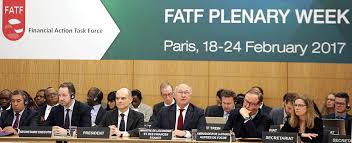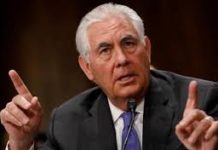By Muhammad Luqman
Pakistan has been given a three-month reprieve by a global terror-financing watchdog over a US-led motion to put the country on a watchlist, Foreign Minister Khawaja Muhammad Asif tweeted late Tuesday.
Member states of the Financial Action Task Force (FATF) have been meeting this week in Paris, where it was expected that they would decide on a US motion — backed by Britain, France and Germany — to have Pakistan added to the so-called ‘grey list’ of countries not doing enough to comply with terrorist-funding regulations.
“Our efforts paid, FATF Paris 20 Feb meeting conclusion on the US-led motion to put Pakistan on watch list….No consensus for nominating Pakistan, proposing three months pause and asking APG [Asia Pacific Group] for another report to be concluded in June,” Asif, who is currently in Russian capital, Moscow, tweeted.
He also suggested the meeting proposed a “three months pause” and asked for the Asia Pacific Group, which is part of FATF, to consider “another report in June”.
Khawaja Asif thanked the friendly countries who helped in averting the difficult situation for Pakistan.
According to media reports, China, Turkey, and Russia, all of whom are part of FATF, opposed the motion which was jointly-moved by the US and the UK against Pakistan.
After failing to arrive at a consensus, the FATF dropped its plan to table the motion for voting in its plenary session .
It is believed that Pakistan’s recent move to ban Jamaat-ud-Dawa and related charities run by Hafiz Saeed played a crucial role in helping Islamabad’s case.
Last Friday, President Mamnoon Hussain promulgated the ordinance that allowed the government to outlaw all organisations that are declared to be terrorists under UN Security Council resolutions.
Ahead of the Paris meeting, Pakistan had called the US move “politically motivated” with an aim to undermine the country’s economic growth.
Pakistan remained on the global terror financing watch list from 2012 to 2015. Had the US move succeeded this time, Pakistan’s economic woes would have multiplied. Not only the cost of doing business would have increased, but the foreign investment could have dried up as well, worsening the country’s macroeconomic position which is already under pressure due to a widening trade deficit and falling foreign exchange reserves.
While delisting the country in February 2015, the FATF had noted that Pakistan made significant progress in improving its anti-money laundering and counter-terrorism financing regime and also established the legal and regulatory framework to meet its commitments in its action plan regarding the strategic deficiencies that the FATF had identified in June 2010.















